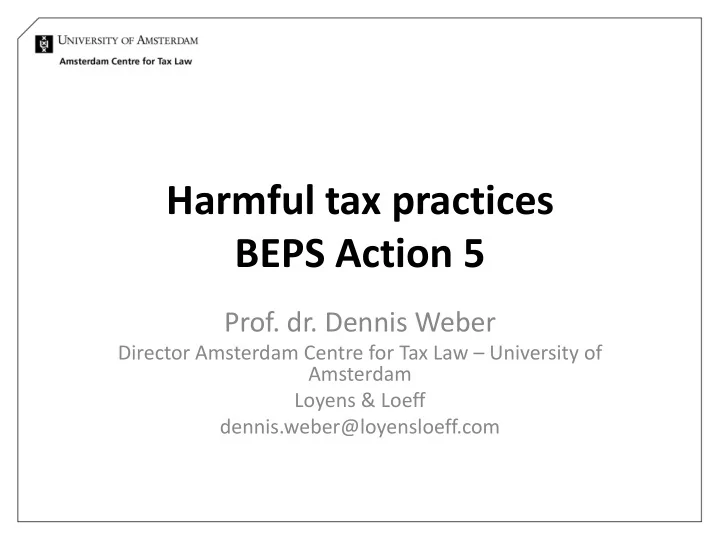

Harmful tax practices BEPS Action 5 Prof. dr. Dennis Weber Director Amsterdam Centre for Tax Law – University of Amsterdam Loyens & Loeff dennis.weber@loyensloeff.com
BEPS Action 5 • 16 th September 2014 Deliverable – Countering Harmful Tax Practices More Effectively, Taking into Account Transparancy and Substance • 11 th November 2014 Germany – UK Joint Statement • 9 th December 2014 Agreement EU Code of Conduct • 5 th February 2015 Agreement OECD/G20 Countries 2
Focus on substantial activity Intangible regimes Nexus approach
Modified nexus approach • Nexus? • Benefits for income arising out of IP • direct nexus between income arising out of IP and the expenditures contributing to that income • Focus on expenditures to ensure that IP regimes encourage R&D activity to taxpayers that in fact engage in such activity (personal nexus)
Nexus Approach 5
IP Assets • Patents and functionally equivalent IP assets that are legally protected and subject to approval and registration processes • No marketing-related IP assets (trademarks, etc)
Qualifying expenditures • Salary and wages • Direct costs • Overhead costs • Cost of supplies • Depreciation (not depreciation of acquisition costs) • NOT: Interest payments, buildings costs, acquisition costs, costs not directly linked to IP asset.
Acquisition and Outsourcing 8
Modified Nexus Approach 9
Example EU/OECD/G20 • Parent acquires IP 10 • Development costs incurred by Parent 100 • Subsidiary incurred R&D expenses 50 • What is the fraction? – Qualifying expenditure = 100 – Maximum up-lift amount 30% van 100 = 30 10
Footnote ‘8’ with respect to Non-EU States • Non-EU States allowed to included under qualifing expenditures: - outsourcing to resident related parties • So allowed to discriminate between resident and non- resident parties • Limited to non -EU States because in the EU this would be a restriction of free movement of establishment/services
Some Issues • What are related parties? • Innovations that do not benefit from patent protection? • Temporal gap between R&D expenses and IP income • CFC-rules • Anti-abuse rules (non-deductibility of royalties) by source States (Austria) • Treaty benefits by source States 12
The Way Forward • Ultimate shut down 30 June 2016 • Maximum 5 year grandfathering • Special rules will be developed for tracking and tracing of R&D expenditure • EU Code of Conduct Group is reviewing right now all EU regimes • If EU Member States will not implement Action 5; European Commission will come with legislation 13
Recommend
More recommend